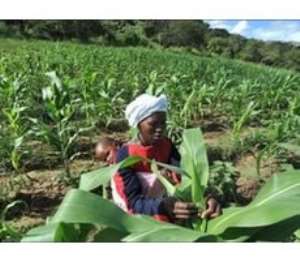
Policies to increase food security in developing countries focus too much on rural food production instead of ensuring that poor people are able to access and afford food, especially in urban areas.
This is contained in a report published on Thursday by the International Institute for Environment and Development (IIED).
It warns that climate change would only make this policy gap worse because the impact of climate change would affect not only harvests but also systems that are used to transport, store, buy and sell food.
“Food security is back on the agenda thanks to rising prices and the threat that climate change poses to agricultural production,” says the report's author Dr Cecilia Tacoli.
“But policies that focus on rural food production alone will not tackle the rising food insecurity in urban areas. We also need policies that improve poor people's ability to access and afford food, especially in urban areas.”
Most people in urban areas, unlike their counterparts in rural communities buy their food.
And any climate-induced disruption to food production, transport and storage – either in the urban area itself or in distant farmlands – could affect food supply and prices in urban areas.
Yet, most policies that aim at increasing food security focus solely on boosting productions from farms and fisheries in rural areas.
“The journey that food takes from a rural producer to an urban consumer involves many steps,” observes Dr Tacoli.
“It must travel through formal and informal systems as it is stored, distributed and sold. Each one of these steps is a point of potential vulnerability to climate change. For consumers, this will mean sharp and sudden increases in food prices.”
The report highlights the link between income poverty and food insecurity in urban areas. For most low-income urban citizens, it revealed, food represents a sizeable portion of the money they spend. Even small increases in prices would have big impacts of food security, with citizens reducing the amount and quality of the food they purchase.
For residents of informal urban settlements, food insecurity is also the consequence of lack of space to store and cook food, lack of time to shop and prepare meals, inadequate access to clean water and often non-existing sewerage systems.
These settlements are disproportionately affected by floods, typhoons, heat waves and other impacts of climate change because they tend to be located in areas more exposed to these events, and because they lack the most basic infrastructure.
Tacoli says that governments must rise to these challenges by ensuring that policies protect the urban poor from food insecurity linked to rising prices, inadequate living conditions and the effects of climate change in both rural and urban areas.
Decent and stable employment is essential but not sufficient, she emphasised, adequate infrastructure and housing and access to formal and informal markets are just as important.
She concluded that “climate change threatens to multiply many of the big challenges that face the world's urban poor.”




 Azumah Nelson faces Irchad Razaaly in a match to empower youth
Azumah Nelson faces Irchad Razaaly in a match to empower youth
 Ejisu By-Election: I’m not a traitor, NDC people appreciate me – Independent can...
Ejisu By-Election: I’m not a traitor, NDC people appreciate me – Independent can...
 Some people expect us to be dogmatic, sycophantic supporters of Akufo-Addo even ...
Some people expect us to be dogmatic, sycophantic supporters of Akufo-Addo even ...
 NDC Campaign: James Agyenim Boateng is the right man to handle communications
NDC Campaign: James Agyenim Boateng is the right man to handle communications
 Mahama pledges to contribute to the development of Gonja Kindom
Mahama pledges to contribute to the development of Gonja Kindom
 “Ghanaman Time”: We've normalized the abnormal, accepted the unacceptable — Dots...
“Ghanaman Time”: We've normalized the abnormal, accepted the unacceptable — Dots...
 Bawumia begins nationwide campaign, starts in Eastern Region today
Bawumia begins nationwide campaign, starts in Eastern Region today
 Bawumia kicks off nationwide campaign with “bold solutions” for Ghana's future
Bawumia kicks off nationwide campaign with “bold solutions” for Ghana's future
 You cannot choose your successor; it’s only God who can – Mahama to Akufo-Addo
You cannot choose your successor; it’s only God who can – Mahama to Akufo-Addo
 Ejisu by-election: Vote for independent candidate Kwabena Owusu Aduomi to uphold...
Ejisu by-election: Vote for independent candidate Kwabena Owusu Aduomi to uphold...
